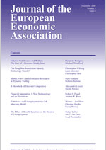 Autores: Constanza Fosco, Matteo Marsili y Fernando Vega-Redondo
Autores: Constanza Fosco, Matteo Marsili y Fernando Vega-RedondoTítulo: Peer effects and peer avoidance: The diffusion of behavior in coevolving networks
Fuente: Journal of the European Economic Association
Resumen: The authors study the long-run emergence of behavioral patterns in dynamic complex networks. Individuals can display two kinds of behavior: G ("good") or B ("bad"). They assume that the exposure of a G agent to bad behavior on the part of peers/neighbors triggers her own switch to B behavior, but only temporarily. They model the implications of such peer effects as an epidemic process in the standard SIS (Susceptible-Infected-Susceptible) framework. The key novelty of their model is that, unlike in the received literature, the network is taken to change over time within the same time scale as behavior. Specifically, they posit that links connecting two G agents last longer, reflecting the idea that B agents tend to be avoided. The main concern of the paper is to understand the extent to which such biased network turnover may play a significant role in supporting G behavior in a social system. And indeed they find that network coevolution has nontrivial and interesting effects on long-run behavior. This yields fresh insights on the role of (endogenous) peer pressure on the diffusion of social behavior and also has some bearing on the traditional study of disease epidemics.
Cómo citar este artículo:
Fosco, C., M. Marsili y F. Vega, 2011. "Peer effects and peer avoidance: The diffusion of behavior in coevolving networks", Journal of the European Economic Association, 8(1), enero, pp. 169-202.
Más artículos






